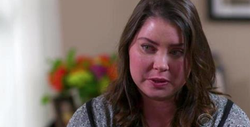Trent Horn is taking on the thorny issue of "dying with dignity":
By now you’ve probably heard of the tragic story of Brittany Maynard, a 29-year-old woman who has an inoperable and terminal brain tumor. While Maynard’s age makes her condition unusual, what has really brought her story attention is her decision to end her life.
"After several surgeries, doctors said in April that her brain tumor had returned and gave her about six months to live. She moved from California to Oregon to take advantage of that state's law and says she plans to end her life soon after her husband's October 26 birthday."
Maynard has also written a defense of her plans to end her own life and says in part:
"I would not tell anyone else that he or she should choose death with dignity. My question is: Who has the right to tell me that I don't deserve this choice? That I deserve to suffer for weeks or months in tremendous amounts of physical and emotional pain? Why should anyone have the right to make that choice for me?"
Mrs. Maynard is going through an agonizing ordeal to which few people can truly relate. So this post is not about her in particular as much as it is about the moral issues that come to bear on her decision.
I recommend dividing this emotional issue into two distinct questions:
1. Do we have a right to commit suicide?
2. Should the government make it legal for doctors to help patients kill themselves?
Let’s start with the first question. You’ll notice I am using the frank language of “killing oneself” or “committing suicide.” The other side of this debate prefers euphemisms like “death with dignity” or “choice in dying," but that obscures the real issue.
Everyone agrees we should have a choice in “how” we die. By that I mean we should be able to choose where we die (in hospice, in a hospital, at home), who we want to stand by us as we end our mortal existence, and whether we will use treatment to delay or even indirectly hasten death.
But once again, do we have a right to commit suicide?
My Life, My Choice?
I think it’s clear we don’t have an unlimited right to kill ourselves. I live in San Diego where it’s not uncommon for people to try to commit suicide by jumping off the San Diego-Coronado Bay Bridge. When that happens, and if there is time, the bridge is shut down, and the police try to talk the person out of what he is about to do. Indeed, whenever anyone threatens suicide, we usually expect the police to stop him. Why? After all, if you have an unlimited right to kill yourself, then the police shouldn’t stop you.
But the reason we forcibly stop these people is because we believe they are not thinking clearly, and they will regret their decision to kill themselves. That’s generally true, but even if they weren’t mentally disturbed we would still probably think their decision to commit suicide was irrational and try to stop them.
If the right to die were truly unlimited, the state would no more investigate a person’s motive to die than it investigates a person’s motives for marrying someone or conceiving a child, actions that also have permanent consequences (though not as grave as the consequences of suicide). The state would let people end their lives without scrutiny, just as it lets people have children or marry.
But since most people would consider the vast majority of reasons a person might give for ending his or her own life to be insufficient, it follows that there is no unlimited right to commit suicide.
Horn takes on common objections and the role of the state at the link.
A good and necessary post.

